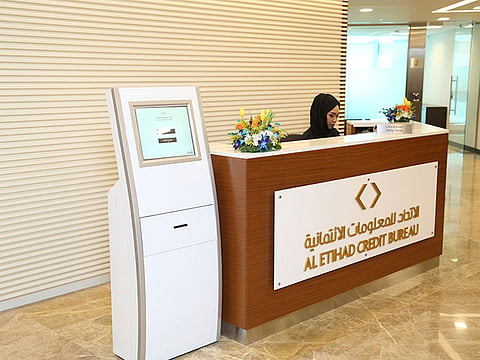UAE’s Credit Score: After phone and utility bills, will tax payments too be part of measurement?
Businesses too come under stringent credit scoring system for loans and more

Dubai: UAE residents need to be on full alert – whether paying their monthly credit card dues or clearing the monthly telephone and utility bills. Because any slip up here could spoil your chances the next time you seek a loan or mortgage from the bank - or end up having to pay extra on the interest payments.
Because all these details about a resident’s main monthly payment transactions will now be part of the ‘Credit Score’, which is what banks and any entity uses to decide whether to have financial exposure with an individual – or a business – in the UAE. Until now, all that loan-seekers had to do was stay on top of their loan instalments and on their credit card bills, and they would have a good credit score to show off.
Now, how those credit scores will be measures have been considerably expanded. This is where the phone and utility payments too form part of the measures, and so does how an individual handles his/her monthly salary. Any hints of over-spending too will count against you during loan processing time.
It all needs to add up
Clearly, the Al Etihad Credit Bureau – the government entity handling the credit score – is busy with the calculations. This week, it said that more than 90 per cent of the 13 million individuals and businesses in the UAE in its database will be covered under the expanded credit checks. It used to be 70 per cent until now.
“While credit information was always traditionally linked to banking obligations, individuals and companies unknowingly start building their credit history when making payments to non-banking institutions,” said Marwan Lutfi, CEO of Al Etihad Credit Bureau (AECB).
Therefore, AECB improved its credit scoring models to use alternative data to compute credit scores for those with no banking credit history.

A 3-digit score
Once the individual or company’s credit score is computed, it shows up as a three-digit number from 300 to 900, which gives a bank, any other lender or auto dealerships an idea as to how likely the client might miss a payment obligation in the next 12 months. (Anything close to that 900 score makes for a lower risk assumption.)

- Amr Yussif, co-founder and CEO of FinFlx
Tightening up on loans
So, keep in mind that any transaction – even to a non-banking entity such as your telecom provider or car dealership – will start to matter going forward. Just saying that all payments due to the bank are on track will not cut it anymore. This applies as much to businesses, more so to SMEs. Patchy payment history will cost them dearly.
The expanded credit score will also include monthly salary and cheque clearance history. In short, “It is an imperative for us to continuously upgrade our methodologies and inclusivity is key to that aim,” Lutfi added. “Previously, approximately 30 per cent of the individuals and companies listed in the AECB credit registry were non-scorable due to lack of borrowing history.”
Lenders in the UAE surely would welcome the expanded scope they now can access on credit scores. This is where UAE’s SMEs will need to engage in a balancing act. Their cost of operations are on the rise, and so are the costs associated with loans they intend to take out. Banks are, according to multiple SME sources, becoming stringent in their loan approval processes, and likely to get more so.
Which is why companies as much as businesses need to make sure their payments are all on track, whether to banks or others. “Non-compliance would lead to a weak or bad credit score, whereby future credits and borrowings would become expensive and at times impossible to get,” said Atik Munshi, Managing Partner at FinExpertiza UAE. “A credit score is largely dependent on a clean history of timely payment of one’s dues, whether a corporate or an individual.”
This would bring in more consciousness and discipline for both companies and individuals and push them to be more compliant.

Will taxes be next?
UAE will in June next year introduce corporate taxes, set at 9 per cent. Plus, the country already has the VAT scheme running for businesses to be in sync with. Could tax payments be the next addition to the credit score measurement mechanism?
According to Nimish Goel, Country Partner at WTS Dhruva Consultants, it could be headed in that direction. “Currently, the data used for generating credit history for companies include telecom, water and electricity bills. It may well be possible that in the future, any tax payments and/or penalties paid by companies could also be used as an indicator of their credit scores.
With the expansion of credit score for UAE residents and businesses, it is imperative for them to be vigilant on their payment obligations which could well determine how good or poor their credit score is.

Mind your ESR percentage too
In April, the Al Etihad Credit Bureau included a new feature on their credit history reports. The expense-to-salary ratio for individuals was a measure of their salary and the various payment obligations they have to make out of that. This was to be additional factoring to assess the creditworthiness and affordability of individuals - and banks. “Credit reports are a direct reflection of an individual’s appeal and payment behaviour to lenders like banks and financial institutions but are also as important for other entities such as property managers and telecom service providers,” explained Marwan Lutfi of AECB. “ESR helps understand one’s affordability rating by showing the total monthly payment obligations reported to the bureau as a percentage of their reported salaries.” The ESR will be a percentage ranging from 0-100+ per cent. Information for the ESR takes into consideration active credit facility instalments, credit card limits and monthly telecom, and utility bills. The individual’s salary is provided by banks as part of the regular data submissions to AECB.
Sign up for the Daily Briefing
Get the latest news and updates straight to your inbox


